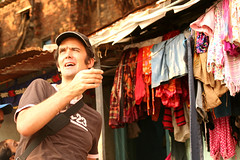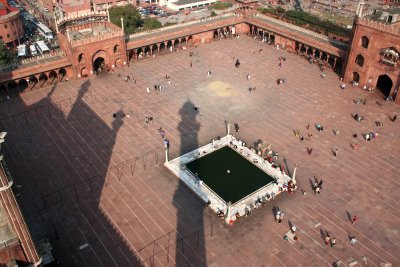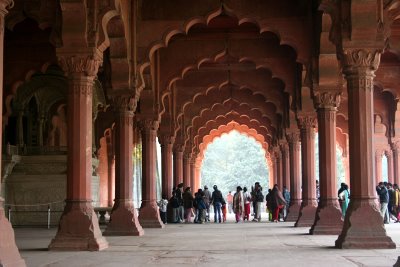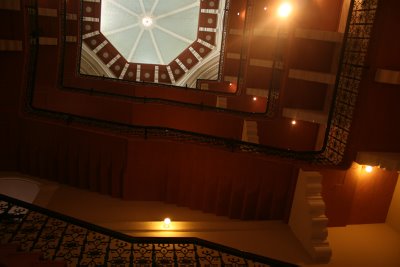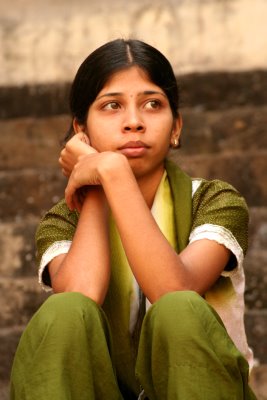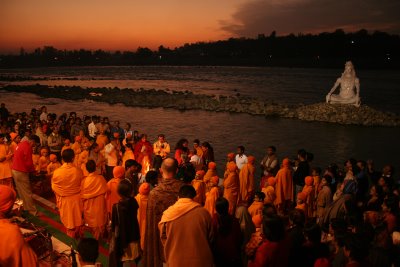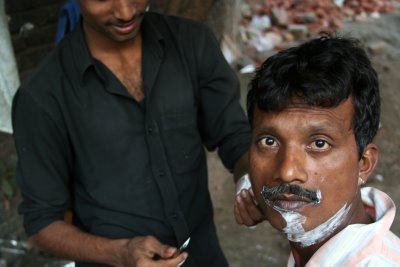We arrive after an uncomfortable flight from Lagos to Nairobi in a decrepit Kenya Airways plane staffed by tall surly men, and a slightly less uncomfortable connection from Nairobi to Bombay in a newer plane with more accommodating female staff. At Bombay local airport, the space is full of light, with a curvilinear contemporary feel. The local airport has an aerodynamic section design and could be anywhere in the world. Three or four free full-colour newspapers are stacked in the racks. Coffee Day – the Indian answer to Starbucks – lies at the end of the terminal. In the departure lounge, a semi-enclosed room with comfy stylish seats shows a local rolling news channel on a huge plasma screen. Stands with every type of phone charger are available throughout. This is airport design from a fresh perspective – how sad and tired Heathrow looks in comparison. We eat succulent corn flavoured with a massala spice mix and then board our local plane for Delhi.
Delhi. Meeting up with our friend Meenaskshi, we go for lunch at a contemporary Indian restaurant in Greater Kailash 1 (locals call it GK1). Then we mooch around the excellent local Full Circle bookshop (on two floors and part of a chain in the city), followed by tea at the Cafe Turtle upstairs. Just like last time I was in Delhi, some warm jazz guitar music comes on through the sound system. A hidden hand beckons me to live here. GK 1, like other shopping enclaves in Delhi, is a series of shops under colonnades spaced around a public park. Usually, there is a good mix of shops and services in each enclave, creating interesting zones dotted around the city, with many in the south of the city.
On the road to Rishikesh the next day – we get stuck in the mother of all traffic jams. Everything comes to a halt – colourfully painted lorries, Ambassador cars and minivans get mired to the spot. Bullock carts coming from the other direction are quickly the only form of moving transport to be seen. I weave through the standing traffic to find out what the problem is. Apparently, some school children are having a race further ahead, with no concern that a major route out of the capital has been blocked.. After about a mile, I come to a crossroads with chairs blocking the road, with no sign of any runners. The air is cool and fragrant, with woodsmoke mingling with eucalyptus. We reverse and take a backroute through a string of villages parallel to the main road, passing by a huge suger-cane factory on the way.. Eight hours later, we arrive at Ananda, in the blue-smudge Himalayan foothills above Rishikesh. All the way, the conversation bounces between entrepreneurship, development and spirituality. Although the journey was long, our excited talk stitched time together.
At Ananda we learn to say Namashkar to everybody and are driven about on golf carts from one part of the complex to another. The days are spent doing yoga, lingering in the spa and having treatments: Shiro Dhara ayurvedic massage (where hot oil is poured steadily onto the forehead), Lithos (an Australian treatment involving being massaged with hot and cold stones), as well as reflexology, Swedish massage etc. Our fellow guests are an interesting cast of characters, fit for a soap opera. A busy-body Aunty figure who likes to tell the people she meets about her global fabric business in Delhi, a handsome woman from the Punjab who introduces herself as a banker. I suggest (from the shape of her eyebrows and her regal nose) that by this must mean a high-flying investment banker, not someone working at Barclays in Hendon Central. She replies quickly – no, I actually work at Barclays in Hounslow. It is of course, a good humoured lie, although I silently gasp in embarrassment before I realise her humour.
One afternoon, we visit a Sati mandir high above Ananda, and catch sight with a gasp at the high snow-peaked Himalayas far off on the horizon. We sit with the temple women in a small room as they bless us and daub our foreheads with a red blotch each. Behind the two women, the shrine, above, many glass lamps hang from the ceiling. The light darkens outside as we sit in the shady interior. Earlier, I had played a quick game of cricket with some local boys. At two or three thousand metres up, it must be one of the highest games of cricket played anywhere in the world. They mock my bowling in Hindi, but are silenced into respect as I thwack the ball hither thither with the bat.
In Rishikesh, one dusk we go to watch the Aarti puja-ceremony on the banks of the Ganga. Hundreds of angelic looking boys in golden shawls sway and sing to the river and to Shiva as night falls. We enter a sacred space-time, where rivers are no longer simply rivers, and myths no longer simply myths.
Back in Delhi, we stay at the Taj Mahal and sample the city. The Tata family (Parsi entrepreneurs) started the Taj Hotel concept off in the early 20th century in Bombay, apparently after Jamsetji Nusserwanji Tata was refused entry to the Oberoi hotel. Dilli Hat is a Spitalfields in India – a lovely craft/artisan market. The newish Delhi metro is fantastic – similar to the Jubilee line extension in London. The fares are 12 rupees per journey, the carriages a hundred meters or more in length and almost twice as wide as their London equivalent. We meet the Garg family – two precociously intelligent brothers to our friend Maneesh. We learn what crores and lakhs are. The conversation is fast and witty and full of insights. Later, we criss-cross the city in Ambassador taxis and the three-wheeler phut-phut autos – GK1, GK2, Haus Kaz, Qutb Minar. We buy clothes in FabIndia, eat sweet potato street food, meet up with the people behind Viveka publishers, tour local print facilities. On New Year’s Eve, we party at the Hyatt with our friends and a thousand other happy people – a judge tries to pick up Bibi, an ecstatic man tries to chat me up. The following day I walk through a local graveyard, feeling at peace with the Anglo-Indian souls at rest there. I spend time sitting with a family selling flowers by a busy road outside, trying to connect with the life of a poor Delhi family.
In the following days, we visit Old Delhi – the hustling bustle of the Chandi Chowk market area, a highpoint being a visit to the Jain temple near Red Fort, witnessing the fluid intricacies of Jain ritual devotion at the core of the most non-violent religion on the planet. We are also touristically obliged to visit the Red Fort – the huge magnificently walled space that was the administrative centre of Delhi (and India) during the Mughal reign, the mighty Jama Masjid mosque nearby and the Qutb Minar – a huge pillar built nearly 1000 years ago. We had planned to visit the famous Museum of Toilets in the south-west of the city, but it didn’t work out that way.
During our forays, I reflected on the oddity that so much of Northern India’s architectural heritage is Mughal in origin – and yet how sad that the Muslim heritage of India is repressed in favour of an illusory Hindhu nationalism… A little like Spain, India has yet to fully embrace the inner complexities of its rich Islamic past. Each day, I follow the story of the Noida killings – the worst serial killing case in Indian history, with over 30 children sexually abused, murdered and dismembered, apparently by the owner of the house and his servant. The media pressure forces various local police chiefs to resign on account of their failure to follow complaints of missing persons up in the past few years. I marvel at the power of the free press in India, in sharp contrast to the toothless inexactitudes of the fourth estate in Nigeria. We discover Tulsi (Holy Basil), and buy tea and ayurvedic tablets. Tulsi is found everywhere and, like its relative Basil, has powerful healing immune-system building properties.
We fly down to Goa, to stay in a friend’s family house in the village of Cansaulim. We are relieved to find ourselves a little off the tourist track, although Goa is so small that one does not have to travel far to be inundated. Unfortunately, the house is within metres of a busy train line, with night trains blasting their horns into the darkness to warn cows and elephants off the track. The Doppler-effect of the horn is a bit like living close to a port, and the sad sound of a ship’s klaxon blasting across the open space of water. We don’t sleep.
In the north of the state, we try and fail to find our friends who are staying at a resort. The north is disappointing; amidst the verdant green paddy fields there are huge ugly billboards by the side of the roads, the roads are filled with Easy-Rider western wannabees buzzing around on scooters and bikes, there are many hippy-type shops that make the place look like Camden Market in the tropics. We are glad to get away.
On the same day, we visit Old Goa, a dead once-was city that rivalled Lisbon at the height of the Portuguese occupation a few centuries ago, as well as a well-known nearby temple. Old Goa these days is two huge churches and a clutch of buildings there about. It is astonishing to think that the Portuguese only fully left Goa in the 1960’s – but not surprising when one considers the strong influence Portuguese aesthetics still has on housing design, and the still-existing links between Goa and Portugal.
The local papers are covering an important stakeholder/community meeting taking place in Panijim, the state capital, about plans for the development of the State. Some NRG’s (Non-Resident Goans) are up in arms about the failures of the past and the weak visions for the future – including Goans who have significant careers in government in Portugal. If the state government is not careful, the development of the region could spiral rapidly downwards, creating a Costa del Goa effect, with ugly hotels attracting bargain basement hordes, ruining the coastal strip. As it stands, there are pressing immediate issues to be resolved such as waste management. The influx of tourists in recent years has massively increased the amount of plastic waste in the towns and villages, creating a serious waste issue, and many dirty streets.
In South Goa, the Russians have taken over for the season. Every resort along the coast is full of them, with menus written in Russian. I spot numerous fantastically attractive blond women with perfect figures, and imagine the criminal careers of their partners, pausing correctively to consider whether the Russian middle class is really strong enough for honest citizens to afford the trip in the numbers that are present here. Finally, I finish reading Maximum City. We meet a British artist who has moved his family to Goa. In London, life was tough getting tougher; he had resorted to becoming a builder, his son was getting bullied in the local school. In Goa, life is looking up – he has a large commission to paint pictures in every room of a new hotel, and his son is going to the local Steiner school, and singing on his way to class every day. He tells us that a Vipassana meditation (10-day silent meditation) retreat he went on a while ago in Herefordshire transformed his life. Another chap we meet, an Australian called Carlos, has just come from a Vipassana retreat at Bodhgaya (where the Buddha reached enlightenment). Just before the trip, I was considering doing Vipassana in the Himalayas, until I realised the course is an obligatory 10 days minimum. All signs are pointing towards doing the course in 2007, perhaps at Dharamsala.
I spend hours at the beach studying the waves – the ominous incoming line that appears a few hundred metres out, the gradual gathering of speed and height, the formation of a crest with the light glittering off the upper folding curve, the left-to-right zipping rim of froth as the crest starts to break, the momentary tunnels created between the under and upper sides of the wave, the crashing of the wave nearer the shore, the bubbling and steaming froth as it peters out by the beach, the slow filmic retraction of white camouflaged seawater. I watch the tide’s effect on the waves, and meditate on all the different sound components of the sea. I imagine being there to witness a tsunami, the drawing back of the sea, the line of terror that appears at high speed on the horizon, the devastation on impact, the falling beneath, the drowning. I also study the patterns of the sand-crabs; when they dig their holes (as the tide is receding), the way they scurry to the edge of the hole as you approach, lingering at the edge for a few seconds, then vanishing as you get closer.
After days at the beach immersed in the subtle complexities of its being, with some more ayurvedic treatments at a local centre, we fly back up to Bombay and meet with our good friends Antonio and Nadia, who are spending a few years travelling around Asia. There is much catching up to do, over food, while shopping and visiting local galleries. We stroll in the early evening along Marine Drive, perhaps the most pleasant public space in the whole city – a concrete pedestrian strip a few miles long along the Arabian sea coast. The drive has recently been done up, with a new concrete barrier. If the Bar Beach project in Lagos is as good as this, a desperately needed new public space will be opened up in the city. Indian culture has for thousands of years appreciated the importance of public space, in the form of the green expanses, called maidans, that are found in many Indian cities. In Bombay, the most significant is called the Oval Maidan. Each day three or four games of cricket take place here in the heart of the city. The players are all dressed in whites, with uniformed umpires. The standard of the cricket is quite good. Perhaps at any one time in Bombay, there are tens of games of formal cricket taking place in all the maidans and gymkhanas of the city, complementing the thousands of informal games of street cricket that are found everywhere. A new tv station advertises itself on billboards as the first 100% 24 hours cricket station, while other adverts promote a multi-player online cricket game, www.zapak.com
We visit our friend’s guru in morning session. In a Breach Candy eyrie, fifteen or so expats and one or two locals sit and ask questions. An old man, with a deficit of teeth launches into philosophical treaties in response to each question. His philosophy is one of ‘non-doing’ – as we are all bound by genes and conditioning, there is not much we can alter about ourselves, therefore we should simply embrace our true nature without pride or guilt, attaining ‘identity-consciousness’. I challenged his passive account of the subject by pointing out that we are each capable of being responsible for our own re-conditioning, he responded by saying that by conditioning, he also meant re-conditioning. At which point, I lost all understanding of his original concept of non-doing.. Still, it was pleasant to be in a well-designed Bombay living room, listening to some sort of philosophical discussion. At the end, his followers took turns to prostrate grandly in front of him and kiss the ground. Our friends then took us on a tour of the Portuguese-influenced community where they stay, as well as to the ghats on the south-western edge of the city. Bibi and I lunch in an excellent Japanese restaurant at the Taj, we went again to Fab India, and we bought many more books (Western books are often fully available in Bombay shops, at a third the price). In the papers, the Noida killings story rumbles on (it looks like it was the servant who did the dirty work), as do more lightweight discussions of the Nollywood god and fully ubiquitous Amitabh Bachchan in comparison to the young pretender, Shah Rukh Khan.
In between cities and places and experiences, the following reflections came to presence:
· India has the edge over China in terms of its strong democratic traditions, as well as the size (100 million) of its middle-class. Although there are deep-seated social tensions arising from the caste system, there is at the same time a well-established belief in the freedom to associate, protest and dissent which is slowly eroding class privilege. Untouchables, known as the dalits, have more rights and freedoms than ever before, although there is still a long way to go. There are five or six Indian companies poised to go global in the next few years, in the wake of the mighty Tata (which has quietly been acquiring Western companies within its 96-company group empire in the past couple of years, including Tata Tea buying renowned UK company Tetley recently) and following on from the Mittal empire, which has a large telecoms company as well as the steel concern within its realm. It is as if a leap in confidence has just occurred to some of these large companies, such that they have realised that it is perfectly possible for Indian companies to be powerful global players. Standards and process efficiencies are high in many Indian companies, with ISO-compliance being widespread.
· The media (tv and print) is going from strength to strength. The nearly-free full colour newspapers are well written and designed, informative and challenging. There are many excellent quality Indian tv stations, with numerous CNN rolling-news type stations in English and other languages. Strangely though predictably enough, in a country which has the second largest Muslim population on the planet, Al-Jazeera is not available through the main cable and satellite networks
· India is deeply connected to its own spiritual traditions. This has direct economic spin-offs. In any society, tourism begins with internal religious-based tourism – people visiting shrines and other sacred sites. With countless gods, temples and shrines and mega festivals like the ongoing Kumbh Mela, Indians are always on the move, creating jobs in the hospitality sector in their wake. The Incredible India campaign is reaping huge benefits – tourism in India is currently worth over 5 billion dollars per annum. Everyday spaces in the dirtiest parts of the city are saturated with sacred motifs – trees have flowers and idols pinned to them.
· India is a difficult place for a black person to visit or live in. Many Indians sadly associate black skin with being Untouchable. There is a visceral reflex against contact, and an automatic superiority complex arises in everyday encounters, and lots of plain old staring and ogling. Much needs to be done to challenge this for Incredible India to always be so to all its visitors.
Read more...



